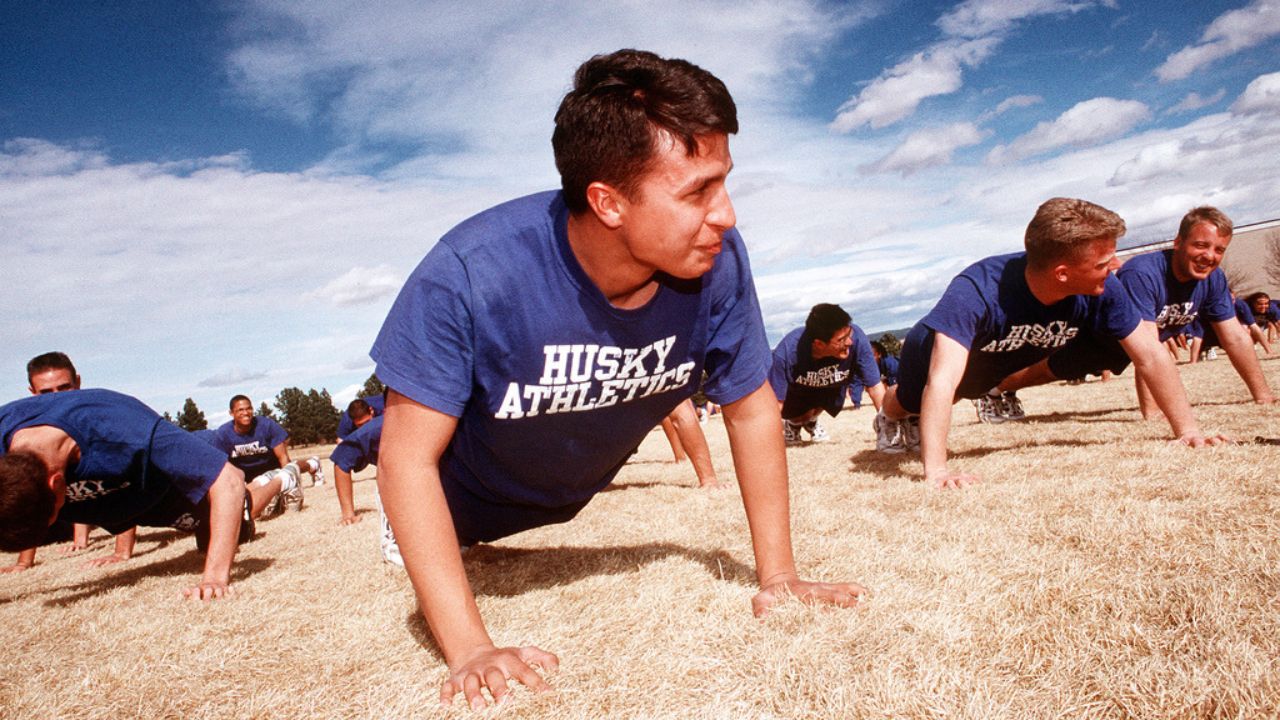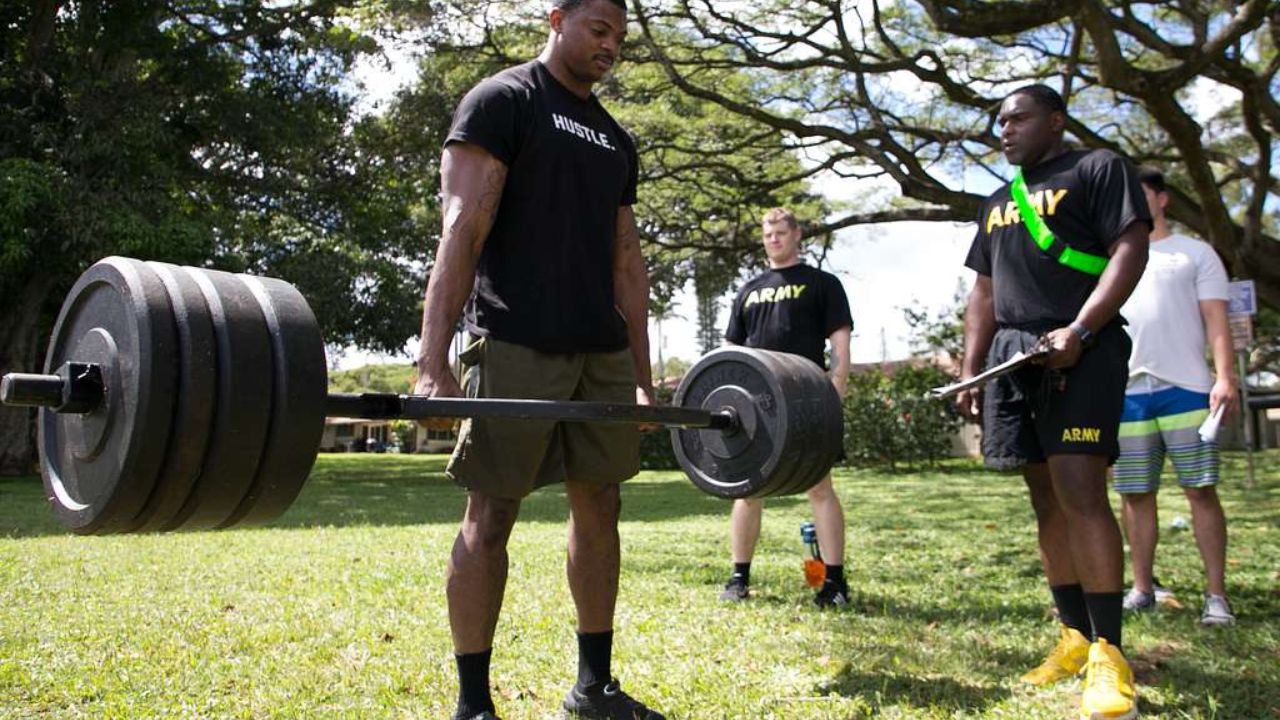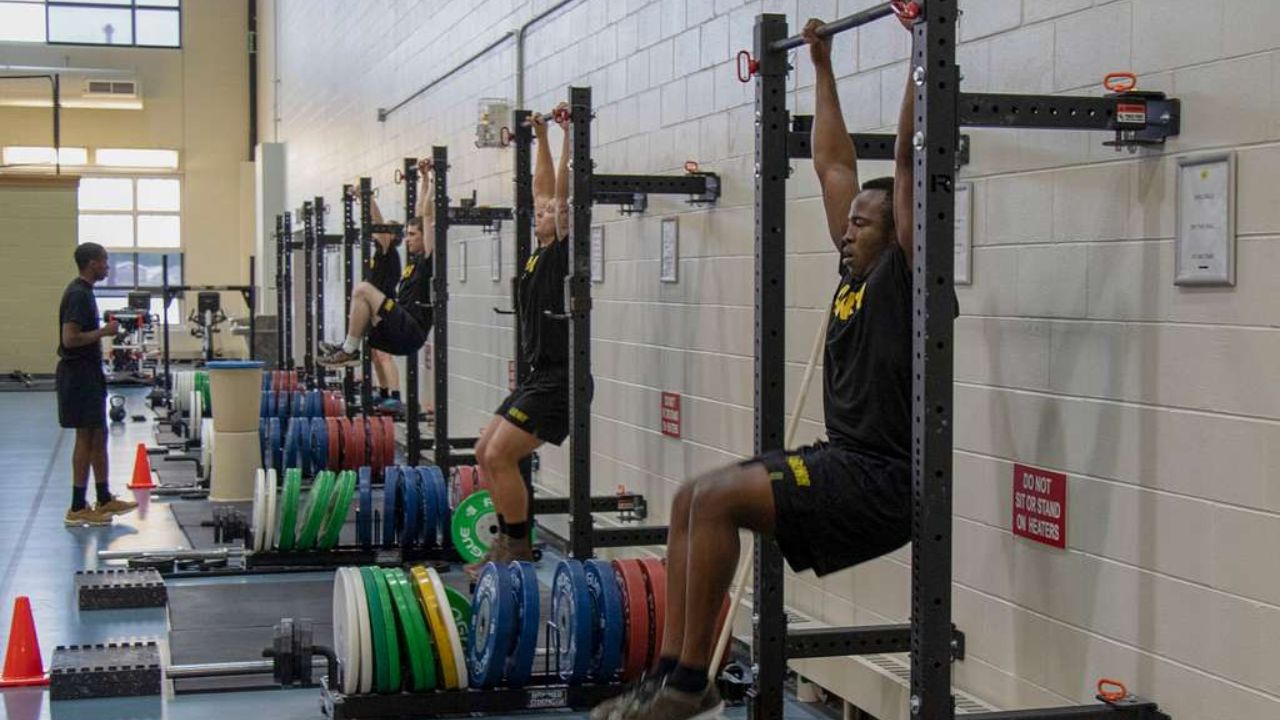
Are you a beginner looking to achieve success in your strength training journey? Look no further! In this beginner's guide, we will provide you with the top 10 tips that will help you reach your goals.
Imagine starting your training with compound movements that engage multiple muscle groups, gradually increasing weight and intensity as you progress.
By incorporating proper form, rest days, and nutritional fuel, you'll be well on your way to achieving the strength and freedom you desire.
Set Clear Goals
To achieve success in strength training, you must set clear goals that will guide your progress. Setting measurable targets is essential as it allows you to track your progress and see how far you've come.
When setting goals, make sure they're specific, realistic, and achievable within a certain timeframe. For example, instead of saying, 'I want to get stronger,' set a goal like, 'I want to increase my bench press by 10 pounds in the next six weeks.' This gives you a clear target to work towards and keeps you motivated.
Start With Compound Movements
You should begin your strength training routine with compound movements, such as squats and deadlifts. Compound movements involve multiple muscle groups and joints, making them highly effective for building overall strength and muscle mass. These exercises also have the added benefit of improving functional movement patterns, which is essential for everyday activities and sports performance.
By starting your training with compound movements, you'll engage more muscles and burn more calories, leading to faster progress and better results. Additionally, compound movements promote better overall body coordination and stability.

As a beginner, it's crucial to focus on mastering these foundational exercises before moving on to more isolated movements. Incorporating compound movements into your strength training routine will lay a solid foundation for long-term success and help you reach your fitness goals faster.
Use the correct technique to ensure optimal results and reduce the risk of injury during your strength training exercises. Proper form is crucial in strength training as it allows you to target the intended muscles effectively while minimizing strain on other parts of your body. Here are some tips to help you prioritize proper form:
- Maintain proper alignment: Keep your spine neutral and your core engaged throughout the exercises.
- Control the movement: Avoid using momentum or swinging your body to lift weights. Focus on controlled and deliberate movements.
- Watch your posture: Pay attention to your posture, especially during compound exercises like squats and deadlifts. Keep your knees aligned with your toes and your back straight.
Gradually Increase Weight and Intensity
As you progress in your strength training journey, it's crucial to gradually increase the weight and intensity to challenge your muscles and continue making progress. Gradual progression is key to prevent injury and allow your body to adapt to the increased demands.
When lifting weights, focus on maintaining proper form and technique to maximize efficiency and effectiveness. This means using the appropriate weight that allows you to perform the exercises with proper technique.
By gradually increasing the weight, you can ensure that your muscles are constantly being challenged and stimulated for growth. It's important to listen to your body and make adjustments accordingly.
Incorporate Rest and Recovery Days
Rest and recovery days are essential for your strength training success. Taking time off allows your muscles to repair and grow stronger, leading to better results in the long run.
Additionally, incorporating rest days helps prevent overtraining injuries and keeps you motivated and energized for your workouts.

Importance of Rest
Make sure to give your body enough time to recover and rebuild by incorporating rest and recovery days into your strength training routine. Rest is crucial for muscle growth and overall progress in your fitness journey.
Here are three reasons why rest is important:
Muscle Repair: During strength training, your muscles undergo microscopic damage. Rest days allow your body to repair and rebuild these muscles, leading to stronger and more resilient muscle fibers.
Prevention of Overtraining: Pushing yourself too hard without proper rest can lead to overtraining, which can result in decreased performance, fatigue, and increased risk of injury. Rest days ensure that you avoid overtraining and maintain your progress.
Enhanced Performance: Rest days allow your body to replenish energy stores, reduce inflammation, and restore hormone balance. This promotes optimal muscle function and boosts your overall performance during workouts.
Recovery for Muscle Growth
Take at least one day off per week to allow your muscles to recover and grow stronger. Recovery is a crucial aspect of muscle growth and shouldn't be overlooked.
During rest days, your muscles have a chance to repair and rebuild, leading to increased strength and performance. Incorporating muscle recovery techniques such as foam rolling, stretching, and proper nutrition can further enhance the recovery process.

Foam rolling helps release muscle tension and improve blood flow, while stretching improves flexibility and reduces the risk of injury. Additionally, consuming a balanced diet with adequate protein, carbohydrates, and healthy fats provides the necessary nutrients for muscle repair and growth.
Avoid Overtraining Injuries
Don't underestimate the importance of incorporating sufficient recovery time into your strength training routine to prevent overtraining injuries. While pushing yourself is essential for progress, it's equally important to give your body time to recover and repair.
Overtraining can lead to a range of common overuse injuries, such as tendonitis, stress fractures, and muscle strains. Here are some key tips for overtraining prevention and promoting effective recovery:
Listen to your body: Pay attention to any signs of fatigue or excessive soreness. If you feel tired or experience pain, take a break and allow your body to rest.
Schedule rest days: Plan regular rest days throughout your training week. These days provide your muscles and joints with much-needed time to recover and adapt to the stress of training.
Prioritize sleep and nutrition: Getting enough sleep and maintaining a balanced diet are crucial for recovery. Aim for 7-9 hours of quality sleep per night and fuel your body with nutrient-dense foods to support healing and muscle growth.
Find a Training Program That Works for You
When you're starting out with strength training, it's important to find a training program that suits your needs and goals.

Personalized training programs offer numerous benefits that can help you achieve success in your fitness journey.
Firstly, a personalized program takes into account your individual fitness level, allowing for a tailored approach that prevents overexertion or undertraining.
Secondly, it enables you to focus on specific areas of improvement, whether it's building muscle, increasing endurance, or improving flexibility.
Additionally, a training program that's customized to your preferences and schedule increases your motivation and commitment to stick with it long-term.
With the freedom to choose exercises that you enjoy and fit into your lifestyle, you're more likely to stay consistent and see results.
Fuel Your Body With Proper Nutrition
To get the most out of your strength training, make sure to fuel your body with proper nutrition so you can perform at your best. Good nutrition is essential for overall health and can provide numerous benefits when it comes to strength training. Here are some nutrition benefits and meal planning strategies to help you optimize your training:
- Proper nutrition provides the necessary energy to fuel your workouts and supports muscle growth and repair.
- Include a balance of macronutrients in your meals, such as carbohydrates, protein, and healthy fats, to meet your body's needs.
- Prioritize nutrient-dense foods like fruits, vegetables, lean proteins, and whole grains to ensure you're getting essential vitamins, minerals, and antioxidants.
When planning your meals, aim for a balanced combination of nutrients and consider incorporating pre- and post-workout snacks to support your training. Remember, fueling your body with proper nutrition is key to achieving success in your strength training journey.

Stay Consistent and Stick to a Schedule
To achieve success in strength training, it's crucial to stay consistent and stick to a schedule.
Setting realistic workout goals will help you stay motivated and focused on your progress.
Finding a training buddy can provide accountability and make your workouts more enjoyable.
Tracking your progress and results will allow you to see your improvements and make necessary adjustments to your training routine.
Setting Realistic Workout Goals
Make sure you prioritize your workout goals and stay consistent with your training schedule. Setting realistic workout goals is essential to your success in strength training. Here are three key tips to help you set realistic goals and track your progress:
Set Specific and Measurable Goals: Clearly define what you want to achieve, such as increasing your bench press by 10 pounds or completing 10 pull-ups. This will give you something concrete to work towards and measure your progress.
Break Goals into Smaller Milestones: Instead of focusing solely on your end goal, break it down into smaller milestones. This will make your progress more tangible and help you stay motivated throughout your training journey.

Track Your Progress: Keep a workout journal or use a fitness app to track your workouts, weights lifted, and repetitions performed. This will allow you to see how far you've come and make adjustments to your training as needed.
Finding a Training Buddy
To stay consistent and stick to a schedule, find a training buddy to help keep you accountable and motivated.
Finding motivation can be challenging, especially when it comes to strength training. Having a training buddy can make all the difference in your fitness journey. Not only will they provide you with the support and encouragement you need, but they'll also hold you accountable for showing up and giving your best effort. This sense of accountability can be a powerful tool in achieving your fitness goals.
Additionally, having a training buddy can make your workouts more enjoyable and fun. You can challenge each other, share tips and techniques, and celebrate each other's progress.
Tracking Progress and Results
Stay on track with your strength training goals by consistently tracking your progress and results.
Tracking your progress not only helps you stay motivated, but it also allows you to measure your results and make necessary adjustments to your training program. Here are three effective ways to track your progress and measure your results:
Keep a workout journal: Write down the exercises you perform, the amount of weight lifted, and the number of repetitions completed. This will help you see your progress over time and identify areas for improvement.

Take regular measurements: Use a tape measure to track changes in your body measurements, such as waist circumference, bicep size, and thigh size. This will give you a visual representation of your progress.
Use technology: Utilize fitness apps or wearable devices that can track your workouts, heart rate, and calories burned. These tools can provide valuable insights into your progress and help you stay accountable.
Listen to Your Body and Avoid Overtraining
Don't push yourself too hard and risk overtraining when starting a strength training program. It's important to listen to your body and avoid burnout.
Overtraining occurs when you exceed your body's ability to recover from exercise, leading to decreased performance and potential injuries. It's crucial to recognize the signs of overtraining, such as persistent fatigue, decreased strength and endurance, increased resting heart rate, and frequent illness.
If you experience any of these symptoms, it's essential to take a step back and give your body the rest it needs. Remember, rest and recovery are just as important as the actual training itself.
Adjust your training volume, intensity, and frequency accordingly to prevent overtraining and maintain a healthy balance in your strength training journey.
Seek Professional Guidance and Support
If you want to achieve success in strength training, seeking professional guidance and support is essential. Hiring a qualified trainer or coach won't only help you avoid injury, but also ensure that you're following the correct techniques and using proper form.

They'll be able to assess your current fitness level and create a personalized training plan that meets your specific goals and needs.
Expert Advice Essential
When starting a strength training program, it's crucial that you seek professional guidance and support for expert advice. While it may be tempting to jump right into training on your own, working with a professional can provide valuable insights and minimize the risk of injury.
Here are three reasons why seeking expert advice is essential for your strength training success:
Personalized Training Techniques: A professional trainer will assess your current fitness level, goals, and any limitations you may have. They can then design a customized training program tailored to your specific needs, ensuring that you maximize your results and stay safe.
Proper Form and Technique: One of the most common mistakes beginners make is using incorrect form and technique. A trainer can teach you the proper way to perform exercises, helping you avoid injuries and optimize your performance.
Progression and Goal Setting: An expert can guide you in setting realistic goals and creating a plan to achieve them. They'll monitor your progress, make adjustments when necessary, and keep you motivated throughout your fitness journey.
Avoid Injury, Hire Professional
To ensure optimal safety and effectiveness, it's essential that you hire a professional trainer to provide guidance and support throughout your strength training journey.

Avoid shortcuts and invest in professional guidance to protect yourself from potential injuries. A knowledgeable trainer will help you understand the biomechanics of each exercise, ensuring proper form and technique. They'll teach you how to use equipment correctly and safely, preventing strains, sprains, and other common workout injuries.
Professional trainers have the expertise to design personalized programs that align with your goals and abilities, minimizing the risk of overtraining or pushing yourself too hard. They can also provide modifications for any existing injuries or physical limitations, ensuring that you can still participate in strength training safely.
Don't underestimate the importance of seeking professional support to safeguard your health and make the most of your strength training experience.
Get Personalized Training Plan
Consider consulting with a professional trainer to develop a personalized training plan that meets your specific needs and goals. Personalized training options offer numerous benefits of individualized instruction, ensuring optimal results and minimizing the risk of injury.
Here are three reasons why investing in a personalized training plan is worth it:
Tailored workouts: A professional trainer will design workouts specifically for you, taking into account your fitness level, abilities, and goals. This customized approach ensures that every exercise is suitable for your body and helps you progress effectively.
Proper form and technique: One-on-one instruction allows the trainer to focus solely on you, correcting your form and technique to maximize results and prevent injuries. They can also provide modifications or alternative exercises if needed.

Accountability and motivation: Working with a trainer provides accountability and motivation, as they keep track of your progress, encourage you to push through challenges, and celebrate your achievements.
Investing in a personalized training plan won't only help you achieve your fitness goals but also empower you to take control of your health and well-being.
Frequently Asked Questions
How Long Should I Rest Between Sets During Strength Training?
To optimize your recovery and rest duration between sets during strength training, it's important to listen to your body and allow yourself enough time to fully recover. This will help prevent injury and ensure you're able to give your best effort during each set.
When performing compound movements, it's important to avoid common mistakes such as using improper form and lifting too much weight. These errors can lead to injuries and hinder your progress in strength training.
How Can I Make Sure I Am Getting Enough Protein in My Diet for Strength Training?
To ensure you're getting enough protein for strength training, focus on high protein foods like lean meats, eggs, and legumes. Additionally, track your protein intake using apps or food diaries to stay on top of your goals.
How Do I Know if I Am Overtraining and What Should I Do if I Am?
If you feel fatigued, have trouble sleeping, or experience decreased performance, you may be overtraining. To recover, take a break, reduce intensity, and prioritize rest and recovery.
Are There Any Specific Supplements That Can Help Support Strength Training Progress?
You may think that supplements are the magic solution to support your strength training progress. But the truth is, focusing on proper pre and post workout nutrition will have a bigger impact.

 Mobility trainingHome Fitness RecoverySports Injury PreventionPersonal Physical TherapyOrthopedic SolutionsPrivacy PolicyTerms And Conditions
Mobility trainingHome Fitness RecoverySports Injury PreventionPersonal Physical TherapyOrthopedic SolutionsPrivacy PolicyTerms And Conditions
